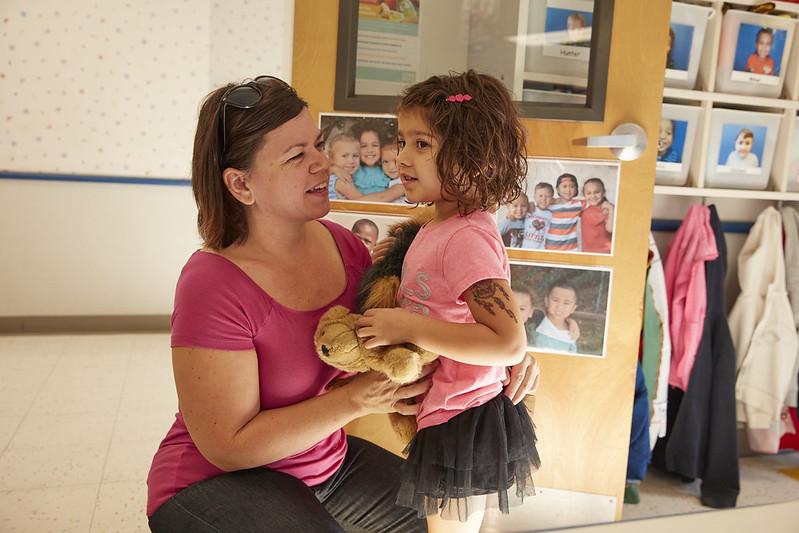Strategies for Engaging in Meaningful Conversations with Your Children

As the school season approaches, a familiar question often lingers in the air: “How was your day?” While this may seem like a simple inquiry, it frequently elicits one-word responses like “fine” or “okay,” leaving parents and caregivers craving deeper conversations with their children. Fortunately, there are impactful strategies that can help ignite meaningful dialogues, enhancing relationships and easing any back-to-school anxieties.
Ariel Bronson, a keen observer of child development and Inclusion Services Advisor at KinderCare, believes that parents don’t have to reserve a specific time for meaningful conversations. Instead, she encourages families to seize those ordinary moments that naturally arise throughout the day. These chats might happen during dinner, while driving home, or even during a spontaneous game; what’s important is that the opportunity is seized.
So, how can parents turn those mundane questions into gateways for richer discussions? Here are some thoughtful strategies to consider:
1. Be Direct and Specific
Instead of asking, “How was school?” consider being more specific. Questions like “What was the best part of your day?” or “What made you laugh at school today?” can lead to richer responses. By narrowing down the inquiry, you encourage your child to share more meaningful experiences rather than just skimming over the surface.
2. Share Your Own Experiences
Creating a reciprocal conversation can foster openness. Share something interesting about your own day before asking about theirs. By doing so, you establish a context for sharing and show your child that everyone has ups and downs, making them more comfortable revealing their own thoughts and feelings.
3. Open-Ended Questions Thrive
Formulating open-ended questions is an excellent way to encourage dialogue. Questions like “What did you learn today that surprised you?” or “If you could change one thing about your school day, what would it be?” can open the floodgates to more expansive conversations, allowing children to express their thoughts more freely.
4. Use “What If” Scenarios
Engage your child’s imagination by presenting intriguing scenarios. For instance, “What if you could create a new rule at school, what would it be?” This not only makes the conversation more fun but stimulates critical thinking while getting them to articulate their ideas.
5. Make It a Routine, Without Pressure
While Bronson emphasizes the importance of taking advantage of those small moments throughout the day, establishing a routine can also be beneficial. It might be a ‘family chat’ time at dinner or before bed. Just be cautious to keep the atmosphere laid-back—there should be no pressure to have an in-depth discussion every time. The goal is simply to promote an environment where sharing is encouraged.
6. Listen Actively
Once the conversation gets going, be sure to listen actively. This means showing genuine interest in what your child is saying—maintaining eye contact, reflecting on their feelings, and responding appropriately. Avoid being overly judgmental; instead, validate their thoughts and emotions, which can build trust and comfort.
7. Explore Emotions
Encouraging children to express their emotions is vital. You might ask, “How did that make you feel?” or “Was there anything today that made you feel upset?” By recognizing and discussing emotions, children become more adept at understanding their feelings and communicating them effectively.
8. Use Transitional Objects or Activities
Sometimes, children may find it easier to talk about their day when engaged in an activity such as drawing, cooking, or working on a puzzle. These ‘transitional objects’ can facilitate a natural dialogue, helping to alleviate anxiety or shyness about discussing their feelings.
Conclusion: Building a Deeper Connection
As children return to school and navigate new social landscapes, it’s essential for parents to remain engaged in their lives. By utilizing these strategies, parents can foster a deeper connection with their children and empower them to express themselves. Parents can set the stage for open, ongoing dialogue that serves as a valuable support system throughout the school year and beyond.
In today’s fast-paced world, a simple conversation has the power to transform a child’s day. So, next time you’re faced with the classic “How was your day?” challenge, remember these techniques to create a rich tapestry of dialogue and connection.
For more insights, tips, and advice on parenting strategies, keep an eye on our blog for regular updates and expert advice.
Remember, the efforts we make as parents can profoundly shape our children’s emotional and social well-being—one conversation at a time!





